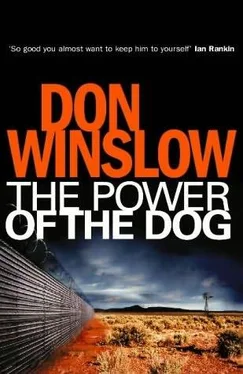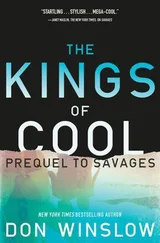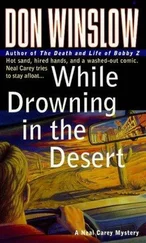Don Winslow - The Power of the Dog
Здесь есть возможность читать онлайн «Don Winslow - The Power of the Dog» весь текст электронной книги совершенно бесплатно (целиком полную версию без сокращений). В некоторых случаях можно слушать аудио, скачать через торрент в формате fb2 и присутствует краткое содержание. Жанр: Триллер, на английском языке. Описание произведения, (предисловие) а так же отзывы посетителей доступны на портале библиотеки ЛибКат.
- Название:The Power of the Dog
- Автор:
- Жанр:
- Год:неизвестен
- ISBN:нет данных
- Рейтинг книги:3 / 5. Голосов: 1
-
Избранное:Добавить в избранное
- Отзывы:
-
Ваша оценка:
- 60
- 1
- 2
- 3
- 4
- 5
The Power of the Dog: краткое содержание, описание и аннотация
Предлагаем к чтению аннотацию, описание, краткое содержание или предисловие (зависит от того, что написал сам автор книги «The Power of the Dog»). Если вы не нашли необходимую информацию о книге — напишите в комментариях, мы постараемся отыскать её.
The Power of the Dog — читать онлайн бесплатно полную книгу (весь текст) целиком
Ниже представлен текст книги, разбитый по страницам. Система сохранения места последней прочитанной страницы, позволяет с удобством читать онлайн бесплатно книгу «The Power of the Dog», без необходимости каждый раз заново искать на чём Вы остановились. Поставьте закладку, и сможете в любой момент перейти на страницу, на которой закончили чтение.
Интервал:
Закладка:
Don Winslow
The Power of the Dog
Prologue
El Sauzal
State ofBaja California
Mexico, 1997
The baby is dead in his mother’s arms.
Art Keller can tell from the way the bodies lie-her on top, the baby beneath her-that she tried to shield her child. She must have known, Art thinks, that her own soft body could not have stopped bullets-not from automatic rifles, not from that range-but the move must have been instinctive. A mother puts her own body between her child and harm. So she turned, twisted as the bullets hit her, then fell on top of her son.
Did she really think that she could save the child? Maybe she didn’t, Art thinks. Maybe she just didn’t want the baby to see death blaze out from the barrel of the gun. Maybe she wanted her child’s last sensation in this world to be that of her bosom. Enfolded in love.
Art is a Catholic. At forty-seven years of age, he’s seen a lot of madonnas. But nothing like this one.
“Cuernos de chivo,” he hears someone say.
Quietly, almost whispered, as if they were in church.
Cuernos de chivo.
Horns of the goat: AK-47s.
Art already knows that-hundreds of 7.62-mm shell casings lie on the patio’s concrete floor, along with some. 12-gauge shotgun shells and some 5.56s, probably, Art thinks, from AR-15s. But most of the casings are from the cuernos de chivo, the favored weapon of the Mexican narcotraficantes.
Nineteen bodies.
Nineteen more casualties in the War on Drugs, Art thinks.
He’s used to looking at the bodies from his fourteen-year war with Adan Barrera-he’s looked at many. But not nineteen. Not women, children, babies. Not this.
Ten men, three women, six children.
Lined up against the patio wall and shot.
Blasted is more the word, Art thinks. Blasted to pieces in an incontinent rush of bullets. The amount of blood is unreal. A pool the size of a large car, an inch thick with black, dried blood. Blood splattered on the walls, blood splattered on the manicured lawn, where it glistens black-red on the tips of the grass. The blades of which look to him like tiny, bloody swords.
They must have put up a fight as they realized what was about to happen. Pulled from their beds in the middle of the night, dragged out to the patio, lined up against the wall-someone had finally offered a struggle, because furniture is tipped over. Heavy wrought-iron patio furniture. Glass shattered on the concrete.
Art looks down and sees… Christ, it’s a doll-its brown glass eyes staring up at him-lying in the blood. A doll, and a small cuddly animal, and a beautifully rendered pinto horse in plastic, all lying in blood by the execution wall.
Children, Art thinks, pulled out of sleep, grab their toys and hold on to them. Even as, especially as, the guns roar.
An irrational image comes to him: a stuffed elephant. A childhood toy he always slept with. It had one button eye. It was stained with vomit, with urine, with all the various childhood effluvia, and it smelled of all of them. His mother had sneaked it away in his sleep and replaced it with a new elephant with two eyes and a pristine aroma, and when Art woke up he thanked her for the new elephant and then found and retrieved the old one from the trash.
Arthur Keller hears his own heart break.
He switches his gaze to the adult victims.
Some are in pajamas-expensive silk pajamas and negligees-some in T-shirts. Two of them, a man and a woman, are naked-as if they had been grabbed from a postcoital sleeping embrace. What once had been love, Art thinks, is now naked obscenity.
One body lies alone along the opposite wall. An old man, the head of the family. Probably shot last, Art thinks. Forced to watch his family killed, and then dispatched himself. Mercifully? Art wonders. Was it some sort of sick mercy? But then he sees the old man’s hands. His fingernails have been ripped out, then the fingers chopped off. His mouth is still open in a frozen scream and Art can see the fingers sticking to his tongue.
Meaning that they thought someone in his family was a dedo, a finger-an informer.
Because I led them to believe that.
God forgive me.
He searches through the bodies until he finds the one he’s looking for.
When he does, his stomach lurches and he has to fight back the vomit in his throat because the young man’s face has been peeled like a banana; the strips of flesh hang obscenely from his neck. Art hopes that they did this after they shot him, but he knows better.
The bottom half of his skull has been blown off.
They shot him in the mouth.
Traitors get shot in the back of the head, informers in the mouth.
They thought it was him.
Which was exactly what you wanted them to think, Art tells himself. Face it-it worked just the way you planned.
But I never envisioned this, he thinks. I never thought they’d do this.
“There must have been servants,” Art says. “Workers.”
The police have already checked the workers’ quarters.
“Gone,” one of the cops says.
Disappeared. Vanished.
He forces himself to look at the bodies again.
It’s my fault, Art thinks.
I brought this on these people.
I’m sorry, Art thinks. I am so, so sorry. Bending over the mother and child, Art makes the sign of the cross and whispers, “In nomine Patris et Filii et Spiritus Sancti.”
“El poderdel perro,” he hears one of the Mexican cops murmur.
The power of the dog.
Chapter One
Seest thou yon dreary plain, forlorn and wild,
The seat of desolation, void of light,
Save what the glimmering of these livid flames
Casts pale and dreadful?
- John Milton, ParadiseLostBadiraguato District
State ofSinaloa
Mexico, 1975
The poppies burn.
Red blossoms, red flames.
Only in hell, Art Keller thinks, do flowers bloom fire.
Art sits on a ridge above the burning valley. Looking down is like peering into a steaming soup bowl-he can’t see clearly through the smoke, but what he can make out is a scene from hell.
Hieronymus Bosch does the War on Drugs.
Campesinos-Mexican peasant farmers-trot in front of the flames, clutching the few possessions they could grab before the soldiers put the torch to their village. Pushing their children in front of them, the campesinos carry sacks of food, family photographs bought at great price, some blankets, some clothes. Their white shirts and straw hats-stained yellow with sweat-make them ghost-like in the haze of smoke.
Except for the clothes, Art thinks, it could beVietnam.
He’s half-surprised, glancing at the sleeve of his own shirt, to see blue denim instead of army green. Reminds himself that this isn’t Operation Phoenix but Operation Condor, and these aren’t the bamboo-thick mountains of I Corps, but the poppy-rich mountain valleys of Sinaloa.
And the crop isn’t rice, it’s opium.
Art hears the dull bass whop-whop-whop of helicopter rotors and looks up. Like a lot of guys who were inVietnam, he finds the sound evocative. Yeah, but evocative of what? he asks himself, then decides that some memories are better left buried.
Choppers and fixed-wing planes circle overhead like vultures. The airplanes do the actual spraying; the choppers are there to help protect the planes from the sporadic AK-47 rounds fired by the remaining gomeros-opium growers-who still want to make a fight of it. Art knows too well that an accurate burst from an AK can bring down a chopper. Hit it in the tail rotor and it will spiral down like a broken toy at a kid’s birthday party. Hit the pilot, and, well… So far they’ve been lucky and no choppers have been hit. Either the gomeros are just bad shots, or they’re not used to firing on helicopters.
Читать дальшеИнтервал:
Закладка:
Похожие книги на «The Power of the Dog»
Представляем Вашему вниманию похожие книги на «The Power of the Dog» списком для выбора. Мы отобрали схожую по названию и смыслу литературу в надежде предоставить читателям больше вариантов отыскать новые, интересные, ещё непрочитанные произведения.
Обсуждение, отзывы о книге «The Power of the Dog» и просто собственные мнения читателей. Оставьте ваши комментарии, напишите, что Вы думаете о произведении, его смысле или главных героях. Укажите что конкретно понравилось, а что нет, и почему Вы так считаете.












